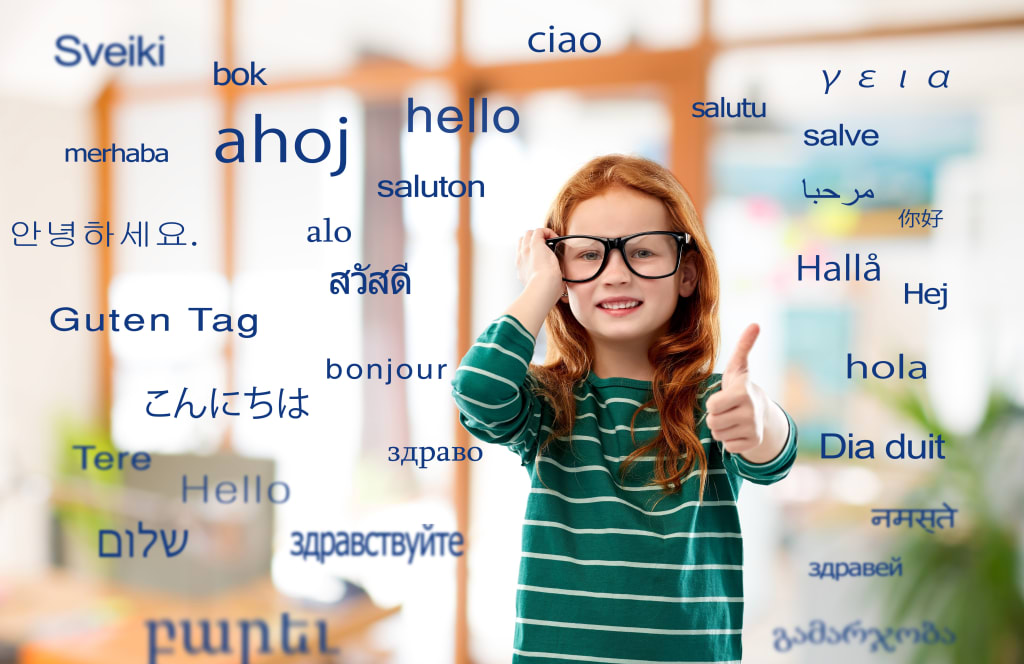Languages Are Not an Issue, But a Tool: Multilingual Children Know How to Use Them
Challenges and satisfactions of parenting multilingual children

Mamma, mangiamo un gelato? My children are asking me; then, my husband answers Welk ijsje willen jullie? Our kids promptly answer back Wij willen een chocolade ijsje! My husband and I agree to go to eat an ice cream because, as we are on vacation, we are not so strict about junk food.
Joyfully, we all get in an ice cream shop.
I entered first, so I order for all of us Hello! We’d like 4 ice creams, please. Our children rush to the counter glass and, pointing to the bucket of chocolate ice cream, ask expectantly to the lady Please, 2 chocolate scoops in a cup with some cream, thank you! … And I want also the smarties on top, thank you! I pick up our ice creams and my husband is going to pay How much is it? And we leave, eager of licking and taste our delicious ice creams. Our kids are smiling: Mamma, è buono il tuo? … Papa, je ijs is erg groot!
This dialog is just a normal scenario in ours and many other international families. I am Italian and my husband is Dutch. We lived abroad in various countries for 11 years. My daughter was born in Wichita Falls TX and my son was born in Lisbon, Portugal. Our children grew up in a multi language environment. We traveled a lot, especially in their first six years of life. Then, we decided to take a pause in Italy for a while, to help them to grow and plant some roots, by living imbibed in one of our family culture. My husband preferred to stay in Italy and, of course, I agreed.
We believe that it’s important to nurture kids’ self-consciousness by living a stable period, especially in their school years, rather than when younger than 6. In facts, ours don’t even remember clearly those wandering, early periods. But they are quite fond of our country house, in the province of Mantua, where we lived for 6 consecutive years, before moving to Verona and, two years ago, to Treviso.
Traveling and living abroad as an expatriate necessarily leads to making a fundamental decision with your partner on the languages that your children will have to acquire. Being well prepared on this issue is even more important if your partner’s mother tongue is different from yours.
To ease your possible concerns about the language your children will use to express themselves, I can tell you how my husband and I managed with ours.
I am not an expert, but as a former Primary school teacher, specialist in English as Second Language (ESL), I studied pedagogy and developmental psychology, as well as language acquisition in early years. Therefore, I could search the right bibliography, make my own considerations based on my teaching experience and find evidence from other international couples’ insights.
Finally, I could decide with my husband about a possible plan to keep flexible, in case of emerging problems. But, so far, 18 years later, we don’t regret any choice we took and instead, we are very satisfied with the results.
As we always belonged to international communities, we privileged English as the social and school language. On the other hand, at home, while my husband and I talk indifferently our own languages, depending on the situations, I only speak to our children in Italian, while my husband does it in Dutch. In the years, my kids have been in contact with German and Portuguese as well and, in school, they followed a few years of German and Chinese.
Today, they attend an international IB school to preserve and develop their English. By living in Italy, of course, they’re fluent in Italian. Dutch, on the other hand, is hanging in there… Still, they can understand quite everything and have normal conversations, though their vocabulary is not so rich and they lack of its writing and grammar. To help them to keep up with it, we send them to their grandparents in the Netherlands, during Summer vacations.
The actual situation is that, at 15 and almost 18, they are
- equally fluent and well literary prepared in English and Italian;
- Dutch is lagging behind, but next, as they will attend universities in the Netherlands, they will pick it up out of necessity and by full immersion courses;
- Chinese and German will remain at a scholastic level, unless they will decide to improve them in the future for personal reasons.
Adding to this situation, my daughter, who loves Jap Anime and culture and Korean pop groups, is self-learning those languages. Instead, my son, who spends hours online with friends from all around the world, developed an interest for Spanish and he’s learning it in exchange of Italian lessons with another Mexican 17-year-old boy.
I came to realize that they don’t consider languages as an issue or a barrier, but a tool to have handy for communication. They are very quick to pick them up, if they have an interest for doing it.
How to Link a Language to a Context
I have several friends from international background, whose kids had similar approaches to languages. What we all have in common is the fact that, in the privacy of our homes, we talk to our kids in our mother tongues, no matter the country we are in.
In international social situations, they speak English, along with their parents, knowing that talking to somebody — even to their own parents — in another idiom is considered highly impolite towards the others who can’t understand what they are talking about. Of course, it’s excused if one doesn’t know English well enough to handle a conversation.
What’s making the trick to raise multilingual children is that parents need to keep those languages and cultures limited to a context, as they were in sealed boxes, each dedicated to one theme only. Following, it’s just a list of few examples about how to link a language to a particular setting:
parents = Native,
school = English,
international friends = English,
native friends = Native,
TV and Media = English
For instance, our kids have to speak Italian to mom and Dutch to their dad. English when they are in school, watching tv, playing with international friends, and when traveling to other countries. They call grandparents in their own related idioms: in Italian, they are Nonno and Nonna and in Dutch, Opa and Oma.
It looks complicated, but it’s not. You need only to be consistent. From the moment you will whisper the first words to your newborn baby and after only a few weeks practicing this method, you will keep going automatically, making it a habit. Your child will probably begin to say her first words after her second birthday, but after that she will leave behind the other children.
In conclusion, I’d like to emphasize that parents must keep languages linked to a fixed context, which relates to a strong motivator — parents, school, friends, travels, etc... They have to set the example. It will support kids to learn and form different mind schemes, not interfering with each others, although flexible to change from one to another, if required.
There you have your happy multilingual child!
Thank you for reading! This is my Raffa’s Newsletter email, if you like to keep in touch with me: [email protected]
About the Creator
Raffaella Ferretti
Italian--MA English Lit.--Storyteller-Poet-Publicist Writer--Primary Italian School and ESL Teacher--Cellist in ElasticOrchestra--Medium Writer-BeingWriters Editor
medium.com/@raffaellaferretti -- scrivoforyou.com -- [email protected]






Comments
There are no comments for this story
Be the first to respond and start the conversation.